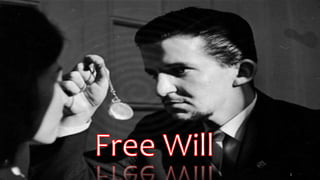Free will is the ability to choose between different possible courses of action undetermined by past events. There are many definitions and perspectives on free will from philosophy, psychology, neuroscience and other fields. Some key points discussed in the document include:
- Determinism suggests human actions are completely determined by prior causes, inconsistent with free will. Compatibilism holds free will and determinism can coexist.
- Experiments show brain activity occurs before a conscious decision, but these may not prove decisions are not made freely. Mental states and unconscious processes also influence behavior in unpredictable ways.
- Reducing human behavior completely to brain physiology is difficult due to emergence and complex interactions. Believing in free will preserves


































